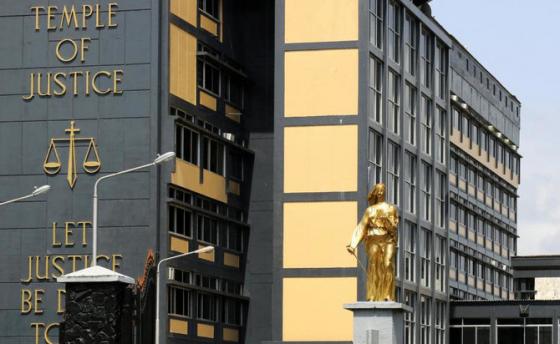Purported ‘Draft Supreme Court Opinion’ Stirs Concern

A view shows the Temple of Justice in Monrovia, Liberia on November 3, 2017.
What appears to be an opinion of the Supreme Court that claimed to have acquitted the embattled Chief Judge Eva Mappy Morgan of the Commercial Court is causing serious concern among justices, members of the Judiciary Inquiry Commission (JIC), and a businessman, Amos Brosius.
Judge Morgan, according to the JIC's investigative findings, was to be held liable for unethical breach and subsequently recommended to the Court for a period of one year suspension without pay and benefits against her.
The JIC is the arm of the Supreme Court that is responsible for the investigation of alleged unethical conduct of judges. The JIC's recommendation was necessitated when Brosius accused Judge Morgan and her court of issuing an illegal order to the management of the Liberia Bank for Development and Investment (LBDI), to unfreeze the escrow account of Ducor Petroleum Incorporated that was housed at the bank.
The order, Brosius claimed, gave his adversary party, the Monrovia Oil Trading Company (MOTC) and Judge Morgan the opportunity to withdraw the amount of US$3.3 out of the disputed Ducor Petroleum’s escrow account at the LBDI, which the JIC's recommendation held Morgan liable. The JIC’s findings were challenged by Morgan and the matter was argued. However, the Supreme Court reserved its opinion on the matter.
But, while the judgment is pending, a circulated document, believed to be a draft opinion of justices of the Supreme Court, has surfaced.
The circulated draft opinion, copy of which is in the possession of the Daily Observer, reads: “The Supreme Court has completed its draft opinion (judgment) surrounding the ethical misconduct case involving the President of the Trial Judges Association and Chief Judge of the Commercial Court, Cllr. Eva Mappy Morgan with a verdict of acquittal. The court draft opinion has been circulated to justices for deliberation before the final decision, consistent with the law.”
If this circulated draft opinion is authentic, it will be the first time in many years for justices of the Supreme Court to disassociate themselves from the investigative findings of the JIC, according to a senior Supreme Court lawyer. The lawyer also observed that it would bring the credibility of members of the JIC to public disrepute.
Some of the members that fixed their respective signatures on the JIC's recommendation were; Associate Justice Yussif Kaba, also chairman, Judge J Boima Kontoe, Judge James Jones, Sister Mary Laurene Browne, Emmanuel Bowier (deceased) and Counselor Jura Lynch of the Liberia National Bar Association (LNBA).
Counselor George E. Henries and Magistrate Nelson Chinneh were the two members who distanced themselves from the recommendation. Immediately after the alleged draft opinion was made public, Brosius expressed concern over the proliferation of draft opinion.
“I just want them to tell me which law the justices rely upon to vindicate Judge Morgan of the JIC’s recommendation,” he said. “People on the JIC are highly respected individuals in the country, and even though some of them were not lawyers, they listened to [mine] and Judge Morgan’s testimonies when we appeared before the commission when they came out with the decision. I am waiting for the real opinion.”
Also, a highly placed source within the office of the Chief Justice, Francis Korkpor, denied knowledge about any of the justices’ involvement with the alleged draft opinion. “The Supreme Court does not work like that, and it is not to [our] knowledge. I read the circulated draft opinion, but it is not true,” the source noted.
In their April 2021 decision, the majority of members of the JIC recommended to the Supreme Court to suspend Judge Morgan for a period of one year without pay and benefits. They also said Judge Morgan was in clear violation of the fundamental rights of Brosius, the 1986 Constitution, the status and Judicial Canon of the Republic of Liberia, in a manner and form so egregious, reckless, callous without remorse.
Further to their recommendation, the commissioner said, “The JIC is also of the opinion that a Liberian businessman Amos Brosius has suffered or is suffering unimaginable pains, agony and mental distress occasioned by the wanton and reckless disposition of Judge Morgan in the matter of the petition for accounting filed by the Monrovia Oil Trading Company (MOTC) against Brosius.”
Therefore, the majority members added, “the JIC advises that Brosius is not precluded by these proceedings to institute action of damages for wrong against Judge Morgan in a competent court of jurisdiction.”
The JIC's findings were resisted, appealed and argued before the Supreme Court, and the court's opinion has been pending with the court for almost six months, prior to the release of the document. The JIC’s findings further said that Judge Morgan’s conduct violates Article 20 (a) of the 1986 Constitution, the right of Brosius, when she presided over the petition for accounting singularly without jurisdiction over the subject matter, when in fact the Commercial Court is presided over by three judges.
“Judge Morgan’s conduct violates the cardinal principle of notice as far as the agreement of MOTC and Brosius to freeze the account of Ducor Petroleum and her illegal orders are concerned,” the JIC findings added.
It can be recalled that Amos Brosius filed a complaint of unethical conduct against Judge Morgan, wherein he accused the judge of unfreezing the controversial Ducor Petroleum's escrow account at the Liberia Bank for Development and Investment (LBDI) and gave the opportunity to his rival party, MOTC to deplete the account of Ducor Petroleum that was in the amount of US$3.3 million without his consent.
Brosius further alleged that the parties, MOTC and him, with the support of Judge Morgan agreed to freeze the Ducor Petroleum’s account at LBDI pending the outcome of the accounting suit, which agreement the judge allegedly violated when she single-handedly wrote the bank to unfreeze the accounts to his disadvantage, thereby demanding the Judiciary for refund.
